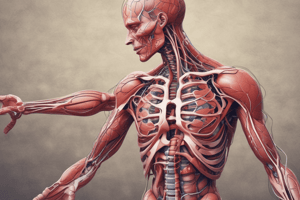Podcast
Questions and Answers
What is the primary function of capillaries in the circulatory system?
What is the primary function of capillaries in the circulatory system?
- To remove waste products from the blood
- To regulate blood pressure
- To pump blood throughout the body
- To exchange oxygen and nutrients with cells (correct)
What is the term for the sequence of events that occurs in one heartbeat?
What is the term for the sequence of events that occurs in one heartbeat?
- Systemic circulation
- Pulmonary circulation
- Cardiac cycle (correct)
- Blood pressure regulation
What is the term for high blood pressure?
What is the term for high blood pressure?
- Hypotension
- Hypertension (correct)
- Atherosclerosis
- Heart failure
What is the term for the blood vessels that carry deoxygenated blood back to the heart?
What is the term for the blood vessels that carry deoxygenated blood back to the heart?
What system regulates heart rate and blood pressure?
What system regulates heart rate and blood pressure?
What is the term for the buildup of plaque in arteries?
What is the term for the buildup of plaque in arteries?
Study Notes
Functions
- Transports oxygen and nutrients to cells and tissues
- Removes waste products from cells and tissues
- Regulates body temperature
- Maintains healthy blood pressure
- Supports immune function
Components
- Heart: muscular organ that pumps blood
- Arteries: blood vessels that carry oxygenated blood away from the heart
- Veins: blood vessels that carry deoxygenated blood back to the heart
- Capillaries: tiny blood vessels where oxygen and nutrients are exchanged with cells
- Blood: liquid tissue that carries oxygen, nutrients, and waste products
Blood Flow
- Pulmonary circulation: blood flow between heart and lungs
- Systemic circulation: blood flow between heart and rest of body
- Cardiac cycle: sequence of events that occurs in one heartbeat
- Diastole: heart relaxes and fills with blood
- Systole: heart contracts and pumps blood
Blood Pressure
- Systolic pressure: pressure during systole
- Diastolic pressure: pressure during diastole
- Hypertension: high blood pressure
- Hypotension: low blood pressure
Blood Vessels
- Elastic arteries: stretch to accommodate blood pressure
- Muscular arteries: control blood flow through constriction and dilation
- Capillary beds: networks of capillaries where exchange occurs
- Venules: small veins that merge to form larger veins
Regulation
- Autonomic nervous system: controls heart rate and blood pressure
- Baroreceptors: sensors that detect changes in blood pressure
- Renin-angiotensin-aldosterone system: hormone system that regulates blood pressure
Disorders
- Atherosclerosis: buildup of plaque in arteries
- Hypertension: high blood pressure
- Heart failure: inability of heart to pump enough blood
- Cardiac arrhythmias: abnormal heart rhythms
Functions of the Circulatory System
- Transports oxygen and nutrients to cells and tissues
- Removes waste products from cells and tissues
- Regulates body temperature
- Maintains healthy blood pressure
- Supports immune function
Components of the Circulatory System
- Heart: muscular organ that pumps blood
- Arteries: blood vessels that carry oxygenated blood away from the heart
- Veins: blood vessels that carry deoxygenated blood back to the heart
- Capillaries: tiny blood vessels where oxygen and nutrients are exchanged with cells
- Blood: liquid tissue that carries oxygen, nutrients, and waste products
Blood Flow
- Pulmonary circulation: blood flow between heart and lungs
- Systemic circulation: blood flow between heart and rest of body
- Cardiac cycle: sequence of events that occurs in one heartbeat
- Diastole: heart relaxes and fills with blood
- Systole: heart contracts and pumps blood
Blood Pressure
- Systolic pressure: pressure during systole
- Diastolic pressure: pressure during diastole
- Hypertension: high blood pressure
- Hypotension: low blood pressure
Blood Vessels
- Elastic arteries: stretch to accommodate blood pressure
- Muscular arteries: control blood flow through constriction and dilation
- Capillary beds: networks of capillaries where exchange occurs
- Venules: small veins that merge to form larger veins
Regulation of Blood Pressure
- Autonomic nervous system: controls heart rate and blood pressure
- Baroreceptors: sensors that detect changes in blood pressure
- Renin-angiotensin-aldosterone system: hormone system that regulates blood pressure
Disorders of the Circulatory System
- Atherosclerosis: buildup of plaque in arteries
- Hypertension: high blood pressure
- Heart failure: inability of heart to pump enough blood
- Cardiac arrhythmias: abnormal heart rhythms
Studying That Suits You
Use AI to generate personalized quizzes and flashcards to suit your learning preferences.
Description
Learn about the functions of the circulatory system, including transporting oxygen and nutrients, and removing waste products. Explore the components of the circulatory system, including the heart, arteries, veins, and capillaries.




